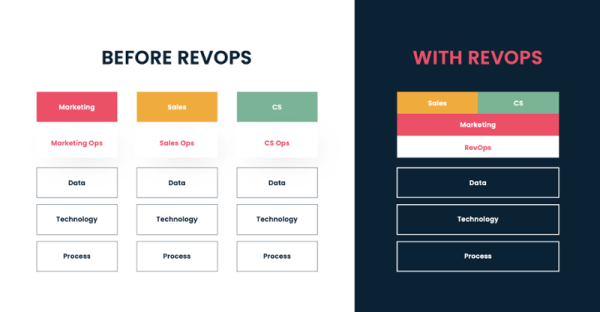


How to Build a Revenue Operations Team for Maximum Efficiency




Are you struggling to grow your business revenue? Do you sometimes feel that your sales, marketing, and customer success teams are not working effectively together? If this sounds familiar, it's time to consider building a revenue operations team. In today's competitive market, having a revenue operations team can help streamline your sales process and drive revenue growth like never before. Let's dive deeper into how you can build a highly efficient revenue operations team that plays a pivotal role in your business growth.
Understanding the Role of a Revenue Operations Team
Before you start building a revenue operations team, it's critical to understand their role. Revenue operations involves overseeing all operations that support revenue growth, which includes sales, marketing, and customer success. The primary purpose of a RevOps team is to strengthen collaboration between these departments and optimise the overall revenue process.

Defining Revenue Operations
Think of revenue operations as the glue that brings sales, marketing, and customer success together. Like a conductor of an orchestra coordinating multiple musical instruments, RevOps managers ensure that all the critical components work together in harmony. From lead generation to nurturing to closing a deal and beyond, Revenue Operations is responsible for monitoring, analysing, testing, and implementing changes.
Revenue operations is not just about optimising the sales process, but also about improving the customer experience as a whole. By analysing customer data, revenue operations teams can identify pain points in the customer journey and work with other departments to address them. This results in increased customer satisfaction and retention, which ultimately drives revenue growth.
Key Responsibilities of a Revenue Operations Team
Some of the primary responsibilities of a revenue operations team include standardising processes and metrics across departments, analysing data to optimise the sales funnel, ensuring the smooth integration of technologies such as customer relationship management (CRM) and marketing automation software, and collaborating with other departments to improve customer experience and retention.
Revenue Operations teams also play a key role in aligning sales and marketing efforts. By working together to develop a shared understanding of the target audience, messaging, and goals, Revenue Operations can help ensure that sales and marketing teams are working towards the same objectives. This alignment leads to more effective lead generation and conversion, which ultimately drives revenue growth.
The Importance of Revenue Operations in Business Growth
According to a survey, businesses that have revenue operations team or agency see a 71% increase in pipeline efficiency and a 70% increase in the speed of lead conversion. However, many businesses still struggle with inefficient processes.
With revenue operations, businesses gain the insight they need to optimise the sales process, engage with customers more effectively, and ultimately drive revenue growth. A well-functioning revenue operations department can significantly improve the customer experience, increase customer lifetime value (CLTV), and ensure that all teams are aligned in their efforts to drive business growth.
In addition, RevOps teams can help businesses stay competitive by keeping up with industry trends and best practices. By staying on top of new technologies and strategies, RevOps can help businesses stay ahead of the curve and continue to drive revenue growth.
Assembling the Right Team Members
Now that you understand the role of a RevOps team, it's essential to assemble the right team members. When building a RevOps team, you want to identify essential roles and skillsets based on your organisation's unique needs.
Having the right team members is crucial to the success of a RevOps team. Each team member brings a unique skill set and perspective to the table, allowing the team to work collaboratively towards a common goal. It's important to identify the roles and skillsets required for your organisation's specific needs to ensure that you have the right team members in place.
Identifying Essential Roles and Skillsets
To identify the essential roles and skillsets required for your RevOps team, start by looking at your organisation's revenue process. Consider the different stages of the process, from lead generation to customer retention, and identify the areas where you need the most support.
RevOps teams typically consist of several essential roles, including a revenue operations manager, sales, marketing, and customer success operations manager, and a data analyst or business intelligence specialist. Additionally, you will need project managers, process engineers, and automation experts to improve the revenue process.
Each team member should have expertise in their specific area of operations management. For instance, a revenue operations manager should have a strong leadership ability, project management skills, and the ability to think critically. A data analyst or business intelligence specialist should have expertise in data analysis and reporting, while an automation expert should possess the technical ability to integrate different tech tools.
Hiring Strategies for RevOps Talent
When hiring RevOps professionals, it's important to focus on individuals with the right mix of technical and soft skills. Look for candidates with excellent communication and collaboration capabilities, as these skills are essential for working effectively in a team environment.
The ideal candidate should have experience working with complex data sets, tools, and technologies, and have a passion for solving business challenges. It's also worth noting that cross-functional experience is increasingly in demand for RevOps personnel, as they must work across departments to optimise the revenue process.
Working with a Revenue Operations Consultant
While it is possible to build and develop a revenue operations team internally, it is important to acknowledge that there is a significant amount of work involved in getting it up and running smoothly. This is where working with a RevOps consultant can be extremely beneficial.
A RevOps consultant is a professional who specialises in revenue operations and has extensive experience and expertise in optimising and streamlining revenue processes. They can provide valuable insights, guidance, and support to help your business establish an efficient and effective revenue operations team.
A RevOps consultant can help you navigate the complexities of implementing and integrating technological tools. They have a comprehensive understanding of the different software and technology options available and can assist you in selecting the right tools that align with your business goals and objectives. They can also provide guidance on how to effectively integrate these tools into your existing systems and workflows.
Furthermore, a RevOps consultant can offer valuable expertise in data analysis and reporting. They can help you establish data governance policies and procedures to ensure data accuracy and consistency throughout the revenue operations process. This is crucial for making informed decisions and driving business growth.
Working with a RevOps consultant is a collaborative process. They will work closely with your internal team to understand your specific needs and goals, and then develop a customised strategy and roadmap for implementing revenue operations. They will provide ongoing support and guidance throughout the revenue operations implementation process, ensuring that your team is equipped with the knowledge and skills needed to succeed.
Streamlining Processes and Technology
With your Revenue Operations team in place and your strategy defined, the next step is to streamline your processes and integrate technological tools. Streamlining your processes and integrating technological tools can help you achieve your revenue goals and improve your overall business performance.
Evaluating and Integrating Tech Tools
There are multiple technology tools for revenue operations, including CRM software, marketing automation, revenue intelligence software, reporting and analytics tools, and project management tools. It's essential to evaluate different options and integrate the ones that align best with your strategy. The goal is to create a tech stack that empowers your RevOps team to achieve their goals and improve your sales, marketing, and customer success operations.
When selecting technology tools, it's important to consider their features and functionality, ease of use, and compatibility with your existing systems. You should also evaluate the vendor's reputation and customer support to ensure that you have access to the resources you need to succeed.
Creating Efficient Workflows and Processes
Once you have implemented technological tools, the next step is to create efficient and effective workflows that allow your revenue operations team to work seamlessly across departments. An example of an efficient workflow is marketing campaigns that are triggered automatically based on specific customer behaviours. This can help streamline your marketing process while more accurately targeting your audience.
Creating efficient workflows requires collaboration across departments, including sales, marketing, and customer success. By working together, you can identify areas where processes can be streamlined and identify opportunities for automation.
Ensuring Data Accuracy and Consistency
Finally, to ensure that data is accurate and consistent throughout the revenue operations process, it's essential to clean and normalise data regularly. Data accuracy is a critical component of decision-making and the overall success of the RevOps team.
To ensure data accuracy, you should establish data governance policies and procedures. This includes defining data standards, identifying data sources, and establishing a process for data validation and cleansing.
By streamlining processes and integrating technology tools, you can create a more efficient and effective revenue operations process. This can help you achieve your revenue goals and improve your overall business performance.
Conclusion
In summary, a revenue operations team can significantly improve your business growth by aligning sales, marketing, and customer success operations, streamlining processes, and using data-driven decision-making. When building a RevOps team, it's essential to identify essential roles and skillsets, hire strategically, encourage collaboration, and develop a coherent strategy. By implementing technological tools and effective workflows, you can improve your sales funnel and your overall bottom-line performance.








